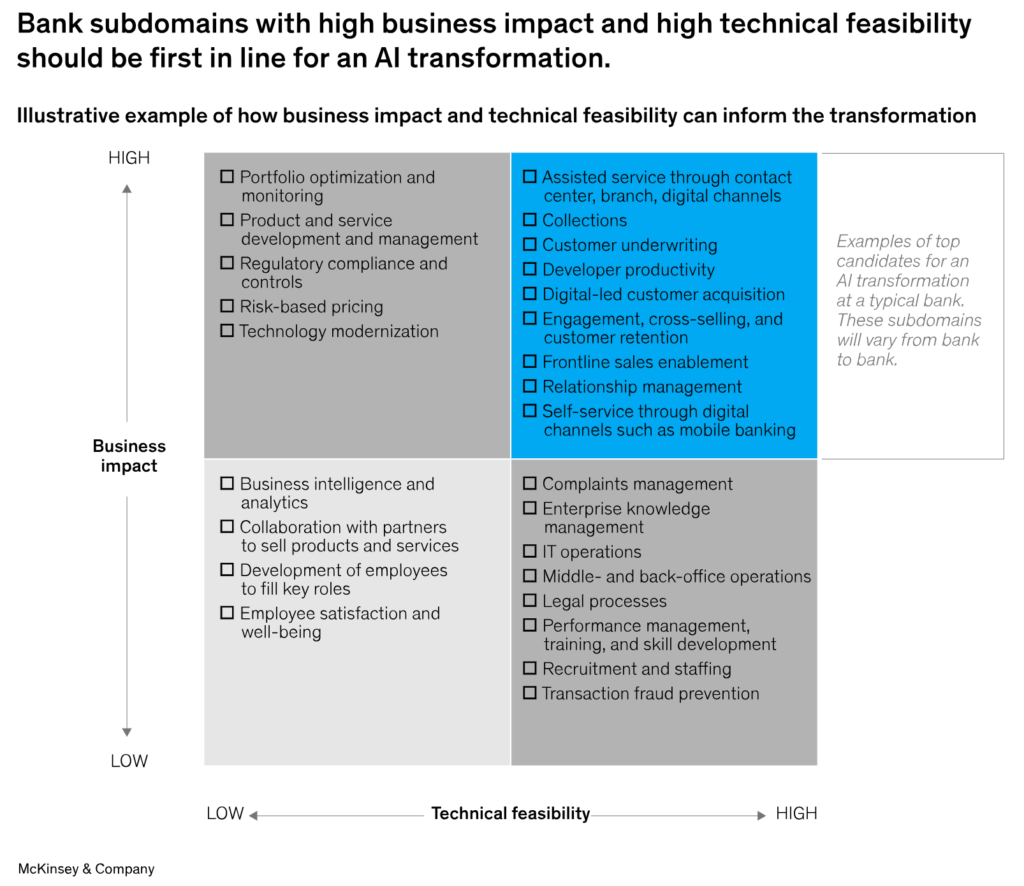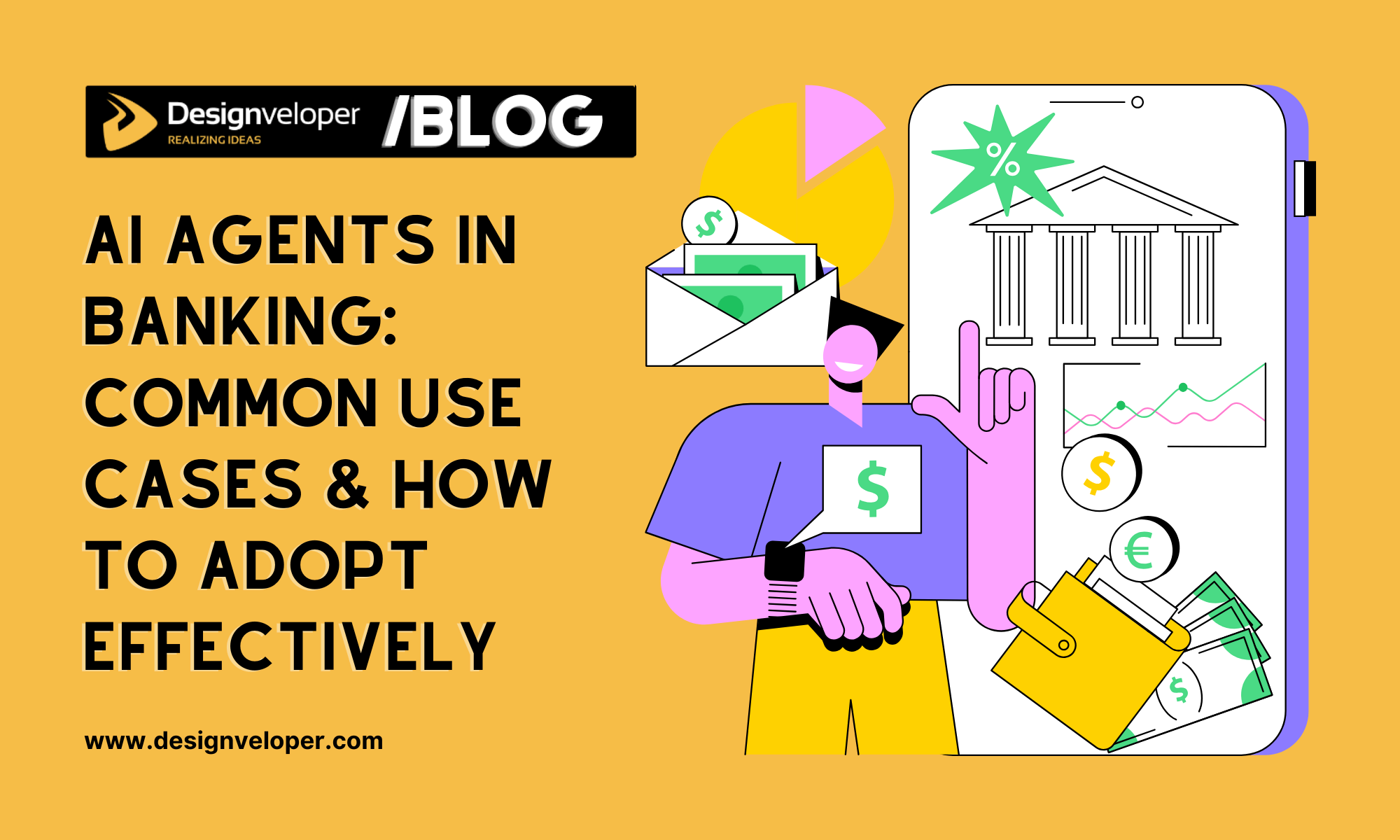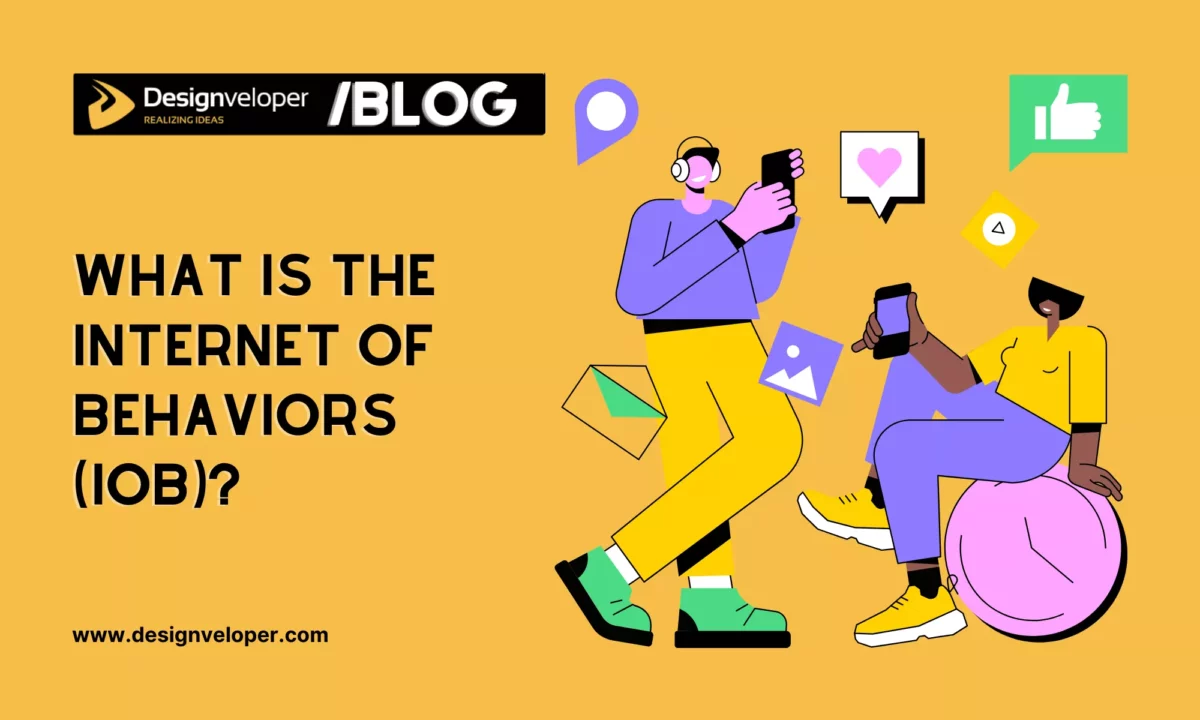
AI agents in banking are software solutions that use artificial intelligence to automate bank-related tasks, from investment analysis to fraud detection.
Unlike traditional AI, these smart agents can make autonomous decisions, learn from mistakes, and refine their approaches. Further, they can memorize past interactions to provide personalized experiences continuously to both customers and employees. AI agents even cooperate with each other, forming a digital workforce to streamline banking operations. They’re expected to help banks make smarter decisions, reduce risk, and increase margins.
But how do banks worldwide leverage AI agents? Do these “intelligent workers” bring real business impacts? Let’s discover these questions with Designveloper in today’s article!
What Encourages Banks to Adopt AI Agents?

We’ve witnessed a rapid shift from predictive analytics to generative AI, and now agentic AI (an intelligent technology that empowers tools to think, act, and learn with minimal human oversight). These AI capabilities have invaded almost every industry, from education and supply chain to banking.
In reality, banks worldwide are facing many visible challenges. A typical problem is the imbalance between employee productivity and high technology investment. One McKinsey research has indicated that the global technology spending in banking has been rising 9% average per year, over doubling its revenue growth. Despite this significant spending, labor productivity still goes down, and the cost of complexity increases, let alone unclear competitive differentiation.
Slowing revenue and loan growth is also another significant challenge. Besides, the competition with organizations beyond banking (e.g., neobanks or fintechs) is more intense, lowering return on tangible equity margins.
AI has transformative capabilities to gradually address these problems. According to the KPMG Intelligent Banking report, a staggering 80% of banks believe that AI will help them achieve a competitive advantage over those who don’t, while 62% expect a moderate to very high ROI from AI investments. Additionally, banks worldwide aim to reduce costs (68%) and improve customer experiences through AI deployments.
FURTHER READING: |
1. What is Voice Technology? Definition and Examples |
2. 5 Common Myths of Artificial Intelligence |
3. What Is Artificial Intelligence? Definition, Types, and How It Work |
The Current State of Adopting AI Agents in Banking
Various banks are still in an experimental stage of AI, and their adoption of AI across multiple business functions is relatively low. They haven’t established clear objectives or KPIs for AI usage, built foundational infrastructure strategically to support AI deployments, and offered in-depth AI training for employees.
KPMG also found that 71% of banks are waiting for how AI technology continues to evolve before committing significant investments. This is a cautious step, yet also a big disadvantage. At McKinsey’s 22nd Global Digital Banking Conference in mid-2025, experts indicated that those still in the experimentation phase may stand far behind and lose ground to faster-moving peers. If banks don’t act fast and strategically, their experimental AI projects won’t have a real impact.
Understanding this matter, various banks are deploying AI agents at scale, mostly to enhance individual productivity (44%). Instead of treating AI as a side project, these banks embed this technology into their strategic planning and decision-making. Each department, accordingly, must establish bold financial and customer goals and adapt its operations to AI. They avoid spreading their investments too widely or wasting money in low-risk projects that bring no real value to their core strategy (e.g., customer support or fraud detection). Instead, they focus on high-impact areas that directly support their long-term vision.
The example below shows a framework to decide which subdomains should be prioritized for AI deployments in a typical bank:

By identifying the right focus, they set up robust data and tech foundations so that AI initiatives can scale effectively across the banks.
Common Use Cases of AI Agents in Banking
AI agents are increasingly the main focus of various banks. By bringing agentic AI into core business units, banks expect these digital workers to handle the following tasks:
Customer-facing tasks
AI agents excel at analyzing vast amounts of data, extracting key information, and answering common questions instantly. For this reason, they’re assigned to handle routine, data-intensive tasks, from resetting passwords and finding nearby ATMs to checking account balances and tracking transactions.
These smart agents also know when a problem goes beyond their abilities and smoothly route it to the right human agent, along with all context. This mitigates the workloads of call center and customer service reps and enhances response time.
By analyzing customer behavior and past interactions, AI agents offer personalized advice, optimize investment decisions, and automate transactions.
One typical AI agent that helps improve customer service in banking is Erica, a virtual financial assistant from the Bank of America. The assistant answers common questions (e.g., about account information or transactions), manages your cards, monitors recurring charges, tracks spending by category, and more. Erica also provides personalized insights to help you manage cash flow better. It also collects information about the most helpful responses. With the assistance of a human team, Erica will learn from your questions and feedback, refining its responses to deliver the latest information and bring the best customer experiences.
Back-office operations
AI agents support bank employees in handling many back-office tasks.
Automate repetitive tasks
Many banks leverage AI agents to automate and accelerate repetitive, time-consuming tasks. For example, a staggering 98% of Morgan Stanley’s financial advisors used AI @ Morgan Stanley Assistant, an internal chatbot that retrieves internal information from 100K documents. The company also released AI @ MS Debrief to automatically integrate meeting notes into CRMs, draft follow-ups, and summarize key action items. Thanks to automation and faster insights, Morgan Stanley’s wealth management team can save hours of routine tasks, increase productivity, and spend more time on strategic initiatives and client relationships.
Detect fraudulent transactions
Various banks use AI agents to detect, prevent, and respond to fraud. Using machine learning, they can identify abnormal patterns that humans or rule-based systems miss.
These smart agents can continuously analyze user behavior, customer transactions, and risk profiles in real time. When something suspicious appears, they will immediately trigger an alert, ask for multi-factor authentication, block access, or flag for manual review. They can learn from new strategies and constantly improve. This capability of AI agents allows banks, which are highly regulated entities, to stay compliant with industry standards and regulations.
One notable AI agent in fraud detection is Feedzai. This platform covers the financial crime prevention lifecycle, from behavioral biometrics and transaction fraud to anti-money laundering. Feedzai has helped retail banks, commercial banks, and other financial institutions prevent financial crime across channels, payment types, and geographies. Look at how Feedzai helped Wio Bank protect its payments:
Automate loan origination & underwriting
AI agents automatically review loan applications and score credit risks by collecting, evaluating, and verifying the profiles of applicants (e.g., income, payment history, or bank transactions). Further, they can personalize underwriting models based on economic conditions or specific customer segments. This helps banks dynamically adjust interest rates in real time. They can also detect potential fraud during loan origination and underwriting processes by identifying fake documentation, mismatches, or abnormal patterns (e.g., many applications from the same IP address).
These agents also automate several tasks during these processes. They involve auto-filling forms using historical customer data, suggesting the right loan products, scheduling document verification, and triggering approval for human review.
The First Hawaiian Bank (FHB) has used Zest’s AI technology for automated underwriting. Integrated seamlessly with the FHB’s loan origination system, Zest AI offers a tailored machine learning model to analyze tens of millions of data points while complying with all ECOA, FCTA, and CFPB regulations. With Zest AI, FHB automated 55% of approvals and declines, a 13X increase from 4% conducted by traditional underwriting methods. This frees up underwriters to handle more complex loan applications and makes credit risk scoring more accurate.
Challenges of Adopting AI Agents
AI agents bring significant benefits to various business units of banks. However, those trying to adopt agentic AI to their routine operations also have to confront various challenges.

Technical infrastructure
Many banks still rely on legacy systems for operations. But these systems don’t always work seamlessly with new AI tools to enable real-time data sharing across departments and offer a unified view of all customer data. Besides, banks need to spend a lot on modernizing API architecture to ensure smooth connectivity between core banking systems and AI agents.
Data quality & legal concerns
Poor data quality can lead to inaccurate autonomous decision-making. Therefore, it’s essential for banks to always ensure data integrity, completeness, and transparency. However, banks may struggle to ensure AI won’t autonomously make any biased decisions, especially in customer service and loan origination, while protecting customer data during processing.
Additionally, in such a highly regulated sector as banking, it’s challenging to clarify how AI makes decisions (e.g., why a loan application was rejected) and decide who should take responsibility if AI makes mistakes. But sometimes, regulatory guidelines can’t catch up with the speed of tech advancement. Therefore, it’s really hard to govern the autonomous actions of AI agents effectively.
Operational risk
When AI agents make decisions – especially those related to a bank’s core business functions – with minimal human oversight, new risks (like overlooking a fraud attempt or denying a loan a a good customer) may arise. These risks may impact the bank’s reputation, cause service delays, or even make bank systems more vulnerable to cyberattacks.
What Will We Expect to See From the Future of AI Agents in Banking?

AI agents have a promising future in banking. The Bank of America predicted that over the next decade, these autonomous workers can change specialized workflows that are traditionally completed by humans and initiate a new revolution that transforms the economy. Chatbots and copilots don’t vanish. Instead, when their capabilities expand, they’ll complement AI agents to implement more tasks effectively.
We also hear of arguments that AI agents will replace humans and therefore lead to large-scale unemployment. However, AI only excels at data-intensive workflows. And in such highly regulated sectors as banking and financial services, where data privacy is paramount and mistakes can lead to serious compliance penalties, humans still remain the center of final decision-making.
The mere adoption of AI agents is not enough to boost operational efficiency and employee productivity. When AI is reshaping the banking sector, banks need to integrate other factors like long-term vision, strategies, and human talent to get the most value from AI agents. Accordingly, the banks will:
- Upgrade their AI strategy to identify where AI can bring durable benefits to the banks. This lays the foundation to build the infrastructure, tools, and talent to realize the AI vision.
- Orchestrate AI agents intelligently instead of managing each agent separately. Accordingly, smart orchestration systems can assign the right tasks to the right agents and offer accurate answers using real bank knowledge. The systems also continuously monitor all the agents to catch issues from early on and ensure seamless collaboration.
- Modernize core infrastructure, ensure data integrity and completeness, and establish robust data governance frameworks.
- Invest in AI specialists and prepare internal teams for the shifts of AI. Further, banks need to upskill their supervision teams and decision makers to evaluate, refine, and apply AI outputs effectively.
Designveloper: Your Trusted Partner in the AI Journey

AI agents play an increasingly important role in banking. They’re adept at handling customer-facing tasks, like answering common questions about bank accounts or investments. Besides, the agents also support bank employees in back-office operations, from retrieving information and identifying fraud to automating loan origination and credit underwriting. Despite some existing challenges, AI agents are expected to keep thriving in banking. However, to leverage AI effectively, banks need to rethink their strategies, upgrade their existing infrastructure, and upskill their employees.
Are you looking for a trusted, experienced partner in this AI transformation journey? If so, Designveloper is willing to help. So, why Designveloper?
- Custom AI development: Whether you want to build tailored AI solutions or integrate the latest AI technologies into core business systems, we have the right expertise and experience to get your idea covered.
- Proven track record: Our team has deep technical skills and long-term experience with AI development projects in banking and financial services. One of our typical projects is Song Nhi, a personal financial assistant that supports individuals in spending and income management.
- Flexible development methodology and techniques: Our team has adopted Agile frameworks (SCRUM, Kanban), coupled with other professional techniques (e.g., Pair Programming), to deliver solutions with the most crucial functionalities on time and within budget.
- Ongoing support and maintenance: We understand that AI deployment is not the final step of the development process. It’s crucial to keep AI solutions updated with the latest technologies and bank knowledge, as well as fix bugs. Therefore, our team offers top-notch technical support and maintenance to ensure the seamless operations of your AI.
Do you want to share your idea with us? Contact our sales rep and receive a technical consultation from our talented developers!






Read more topics
You may also like





























































